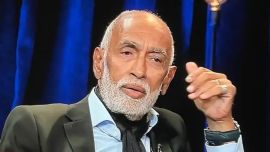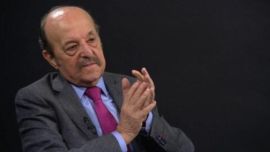The final confirmation of Economy Minister Sergio Massa as the leading presidential candidate for the newly-minted pan-Peronist coalition, Unión por la Patria, has opened the door to one of the most decisive moments of the election, as campaigning truly gets going ahead of the PASO primaries. Things are getting serious and the political system is showing its true colours, with all sorts of treachery and mischief coming to the fore. Massa’s antics – both to secure the nomination at the expense of his rivals and in the municipality of Tigre – act as a harbinger of things to come, revealing the level of his ambition and thirst for power. Ultra-liberal economist Javier Milei, in the eye of the storm for allegedly offering up places on his party’s ticket for cold hard cash, comes as his star begins to wane in the opinion polls. The libertarian still retains a healthy portion of the voting intention figures, which suggest he will have a say in the election and, in some respect, in the coming administration’s capacity to govern. For Juntos por el Cambio, the opposition alliance that thought they had the election in the bag, the schism between Horacio Rodríguez Larreta and Patricia Bullrich is threatening coalition unity, to the point where the Unión Cívica Radical (UCR) is now entering into bitter disputes with Mauricio Macri’s PRO party, historically a primus inter pares. The primaries are essentially a first-round vote and will set the stage for a much disputed general election where every player still has chances, much more so given the expectation of a run-off vote in November.
Massa has a lot of detractors and has been identified as an ambitious opportunist by those who dislike him (it was Macri who previously dubbed him “ventajita” or “petty advantage.”). Despite having once been a flaming anti-Kirchnerite who promised to end the corruption perpetrated by La Cámpora — the Kirchnerite political organisation led by Máximo Kirchner — he has ended up becoming Cristina Fernández de Kirchner’s leading candidate for president. The Frente Renovador leader worked hard to sabotage the aspirations of both Interior Minister Eduardo ‘Wado’ De Pedro — CFK’s political protégé — and Daniel Scioli, the former Buenos Aires Province governor who was also Néstro Kirchner’s vice-president and lost the 2015 presidential run-off to Macri. Whatever he actually did, Massa secured the blessings from Fernández de Kirchner and President Alberto Fernández, along with the key support of provincial governors, probably in exchange for key concessions in every case. His allies appears to have been left off of some of the key spots on the congressional tickets with Máximo leading the lists in the Chamber of Deputies and Wado in the Senate, and didn’t managed to secure a “unity” candidacy with leftist social leader Juan Grabois desisting from having desisted from his bid. Grabois is much more palatable for the more purist Kirchnerites than Massa, a man with ties to the political establishment in the United States and the private sector in Argentina, but the economy minister could absorb a potentially tough electoral defeat without draining the Kirchners’ political capital all that much.
According to a leading economist who met with Massa when he took over the economy portfolio in the midst of a tough run on the currency, the Tigre leader never intended to put in place a stability plan that included a fierce devaluation. The official version of this tale was that he wasn’t allowed to do this, given Kirchnerite pressure. If this is so, then it isn’t clear what economic plan Massa could bring to the table, particularly given his personal involvement with the IMF deal. If he were indeed deceiving the electorate – which generally consider him a business-friendly candidate that will push forth with much-needed structural reform – he could have the chance of being electorally competitive, which could grant the pan-Peronist coalition a substantial portion of power, including CFK and her acolytes. Massa’s voracity appears to be in play in Tigre too, the municipality where he became a strongman and where his wife, Malena Galmarini, was looking to compete for the mayorship against his successor, Julio Zamora. According to the current mayor, Massa’s people aggressively pressured the incumbent and members of his cabinet, forcing resignations and attempting to get him to desist from competing in order to pave the way for Malena. Ultimately, Zamora managed to earn the right to run for re-election but the behind-the-scenes altercations point to an aggressive way of exerting political power.
With Milei, the worst of the usual bad inclinations of Argentina’s political system appear to be the norm, much to the distaste of a candidate whose main campaign promise is to eliminate the political caste. The man who promises to drain the swamp has now been accused of selling spots on his tickets throughout the whole country, allegedly asking for anywhere from US$10,000 to US$100,000 in order to bear his emblem and run in his party, La Libertad Avanza. The main perpetrators are supposed to be high-ranking political organisers who were recently laid-off, and Milei’s team suggests the accusations are nothing more than the angry rants of those who didn’t make it onto the lists. At the same time, he’s allied himself with provincial leaders that are pure expressions of the “caste” and is even being accused of teaming up with the Peronists in the Buenos Aires Province, both in terms of financing and in the make-up of his candidate lists. All of this is occurring as the eccentric economist slides in the polls, putting him apparently below the Peronists and potentially out of the expected run-off.
Things aren’t going so well for Juntos por el Cambio either. Despite leading voting intention figures since pollsters began speculating over the election, they’ve lost ground. Rodríguez Larreta has faced fierce opposition, particularly in the form of his rival, Patricia Bullrich, who has been leading a majority of opinion polls in a hotly contested primary. Antagonism between the duo has grown, calling into question whether the loser will actively collaborate with the winner, and help drag his or her votes over. Furthermore, there is also an explicit deal between sectors of PRO (to which Macri, Rodríguez Larreta, and Bullrich belong), and the UCR, the historic party currently led by the mayor’s running-mate, Gerardo Morales. They are pursuing an aggressive strategy to block Jorge Macri’s bid for the mayorship, with Martín Lousteau trying to get an upper hand. Rodríguez Larreta publicly claims Jorge Macri is his candidate, but has played in Lousteau’s favour. The cause could be a bitter dispute with Mauricio Macri, his former mentor turned opponent who has supported Bullrich’s candidacy to the point where it appears she could now win the opposition presidential primary.
The relative parity in terms of voting intention makes it difficult to predict what could happen. Immediately after Massa’s confirmation several surveys showed him potentially as the single most-voted-for candidate, an honour that had been Milei’s to date. Beyond the usual suspicion that Argentine polls deserve, Juntos por el Cambio is still looking like it should take the election with the sum of the votes of its two candidates, while Milei and Unión por la Patria will have to battle it out for the second place, all within a very tight range. At this point, the PASO primaries are up for grabs and the way things are going, the quickest, meanest, and baddest candidate will prevail.


















Comments